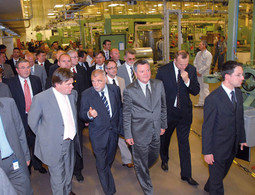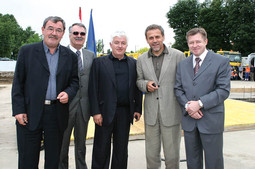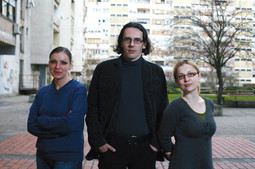Published in Nacional number 638, 2008-02-05
ACTIVIST WITH A SUSPICIOUS PAST
Secrets of the Bosnian trashing Croatia
Nacional reveals the past of the Bosniac who attacked Croatia in the television show 'Nedjeljom u dva' (Sunday at two), presenting himself as a human rights activist.
 ˝Croatia is founded on organized crime˝, ˝the cigarette mafia has bought Croatian politicians˝, ˝Milan Bandic purchases laptops for journalists˝: these are only some of the explosive statements made by Munir Podumljak, the head of the Partnership for Social Development association. Even though he did not support these strong accusations with any concrete evidence, Podumljak has already received an epithet in the public and media of being a ˝fearless fighter against corruption˝ and ˝Croatia’s Eliot Ness˝, and he even received an elite television slot in the show ¨Nedjeljom u 2˝ for his publicity needs, where he made a range of unbelievable accusations against many. However, Podumljak did not explain how he, as a foreign citizen, found himself in Croatia and based on what facts, as a guest, he bases his criticism of the Croatian government. From various different sources over the past several days, however, it is clear that he is a suspicious individual who is, on one hand, connected to war crimes in Bosnia and Herzegovina, and on the other hand, there is a range of evidence which indicate that he is an intelligence mercenary who, on the account of foreign services, has discredited the Croatian government and politicians.
˝Croatia is founded on organized crime˝, ˝the cigarette mafia has bought Croatian politicians˝, ˝Milan Bandic purchases laptops for journalists˝: these are only some of the explosive statements made by Munir Podumljak, the head of the Partnership for Social Development association. Even though he did not support these strong accusations with any concrete evidence, Podumljak has already received an epithet in the public and media of being a ˝fearless fighter against corruption˝ and ˝Croatia’s Eliot Ness˝, and he even received an elite television slot in the show ¨Nedjeljom u 2˝ for his publicity needs, where he made a range of unbelievable accusations against many. However, Podumljak did not explain how he, as a foreign citizen, found himself in Croatia and based on what facts, as a guest, he bases his criticism of the Croatian government. From various different sources over the past several days, however, it is clear that he is a suspicious individual who is, on one hand, connected to war crimes in Bosnia and Herzegovina, and on the other hand, there is a range of evidence which indicate that he is an intelligence mercenary who, on the account of foreign services, has discredited the Croatian government and politicians.
Munir Podumljak, known as Mickey or Miki, was born on 20 April 1970 in Sarajevo. His only family members are his father Mujo and his mother Nurija, and he completed both elementary and electrical trade school and received a diploma as an IT electrician in Sarajevo. In 1988, he began studying Yugoslavian language and literature at the Faculty of Philosophy in Sarajevo, and not long after he completed his military service in the former YNA, in the technical air force base in Sombor, and later in Podgorica. After that, he continued his studies in Sarajevo, which he quit in 1992 because of the war where he volunteered in the special police for the Internal Affairs Ministry of Bosnia and Herzegovina in Sarajevo. His direct boss was Sead Siljak, and the commander of the entire formation was Dragan Vikic. According to his own statement, his job included security services for the Parliamentary building in Sarajevo, as well as security jobs for protecting protégés; there is an indication that for a certain time he was actually a member of the then paramilitary unit Juka Prazina, which is suspected today for unsolved war crimes. In unclear circumstances, Podumljak left the special police in 1994: he explained his departure as his unhappiness that those who committed war crimes were never processed, but some sources point out that criminal proceedings began against him at that time, and are still ongoing today.
 PRESIDENT Stjepan Mesic at the opening of the new TDR factory in Kanfanar: Podumljak claims that the 'cigarette mafia has bought Parliamentary representatives' In the same year, Podumljak successfully got involved in the Sarajevo civil scene: he was one of the founders of the Libero magazine, and he established the International Centre for Assistance, Communication and Relations Association which he was the director of until 1997. He began to deal with radio journalism in 1996 and he led a contact show; he held several training courses for journalists on the role of media in reducing ethnic violence in the regional centres of the Organization for Security and Co-operation in Europe (OSCE). At the end of 1996, his contact with foreign military intelligence circles became more common: he grew close to the leadership of the then IFOR, NATO peacekeeping mission in Bosnia and Herzegovina, and he became a supervisor for media analysis for IFOR in Sarajevo; he also followed news on extreme fundamentalism and organized crime for NATO. In 1997, he was employed as the director of the Institute for Human Resource Development in Sarajevo and the following year, the leadership of IFOR recommended him to Raymond Shonholt, the president of the humanitarian association Partners for Democratic Change (PDC) from San Francisco, who was searching for the right person for the position of Deputy Director in the branch office in Zagreb. Most of the registration work for the Croatian branch office was carried out by Damir Vucic, a former employee of the US Embassy in Zagreb, and Podumljak was appointed as Deputy Director on 1 January 1999. Even though it is not common for a citizen of a foreign country to run an association in another country, several sources have stated that at the end of 1998 Podumljak attempted to leave Sarajevo at any cost, which is connected to the criminal proceedings against him which are allegedly still ongoing. At that time, he had already become interesting to the national security services because it was clear that behind his mask in the so-called NGO scene, Podumljak actually was gathering intelligence information in Croatia for the needs of the US Embassy, such as the financial operations of Hvidra and its members.
PRESIDENT Stjepan Mesic at the opening of the new TDR factory in Kanfanar: Podumljak claims that the 'cigarette mafia has bought Parliamentary representatives' In the same year, Podumljak successfully got involved in the Sarajevo civil scene: he was one of the founders of the Libero magazine, and he established the International Centre for Assistance, Communication and Relations Association which he was the director of until 1997. He began to deal with radio journalism in 1996 and he led a contact show; he held several training courses for journalists on the role of media in reducing ethnic violence in the regional centres of the Organization for Security and Co-operation in Europe (OSCE). At the end of 1996, his contact with foreign military intelligence circles became more common: he grew close to the leadership of the then IFOR, NATO peacekeeping mission in Bosnia and Herzegovina, and he became a supervisor for media analysis for IFOR in Sarajevo; he also followed news on extreme fundamentalism and organized crime for NATO. In 1997, he was employed as the director of the Institute for Human Resource Development in Sarajevo and the following year, the leadership of IFOR recommended him to Raymond Shonholt, the president of the humanitarian association Partners for Democratic Change (PDC) from San Francisco, who was searching for the right person for the position of Deputy Director in the branch office in Zagreb. Most of the registration work for the Croatian branch office was carried out by Damir Vucic, a former employee of the US Embassy in Zagreb, and Podumljak was appointed as Deputy Director on 1 January 1999. Even though it is not common for a citizen of a foreign country to run an association in another country, several sources have stated that at the end of 1998 Podumljak attempted to leave Sarajevo at any cost, which is connected to the criminal proceedings against him which are allegedly still ongoing. At that time, he had already become interesting to the national security services because it was clear that behind his mask in the so-called NGO scene, Podumljak actually was gathering intelligence information in Croatia for the needs of the US Embassy, such as the financial operations of Hvidra and its members.
 MILAN BANDIC and his colleagues are also a target of Podumljak’s attacks, even though the City of Zagreb gave his association office space In the fall of 1999, Podumljak re-registered the PDC branch office into the Partnership for Social Development, and quickly became part of the Croatian NGO sector. Representatives of NGO associations who were then involved in the “Glas 99“ (Vote 99) campaign remembered that he suddenly became part of the aforementioned program together with American consultant Bradley Starks, backed up by the American government’s USAID Agency. At that time, he was already suspicious because of his special interest in various information, and because he appeared out of nowhere onto the Croatian NGO scene with a clear ambition to control and coordinate the work of other associations. After the elections, he became a consultant in the Fade In Association which produces television shows, while in July 2000, with several colleagues, he established ˝Potestas d.o.o.˝, which exists today, but has never had an employee.
MILAN BANDIC and his colleagues are also a target of Podumljak’s attacks, even though the City of Zagreb gave his association office space In the fall of 1999, Podumljak re-registered the PDC branch office into the Partnership for Social Development, and quickly became part of the Croatian NGO sector. Representatives of NGO associations who were then involved in the “Glas 99“ (Vote 99) campaign remembered that he suddenly became part of the aforementioned program together with American consultant Bradley Starks, backed up by the American government’s USAID Agency. At that time, he was already suspicious because of his special interest in various information, and because he appeared out of nowhere onto the Croatian NGO scene with a clear ambition to control and coordinate the work of other associations. After the elections, he became a consultant in the Fade In Association which produces television shows, while in July 2000, with several colleagues, he established ˝Potestas d.o.o.˝, which exists today, but has never had an employee.
Even though he established the company, Podumljak continued to work in the Partnership for Social Development Association. In the same year, he travelled to Kosovo several times, where he held various training seminars in the OSCE centres, and in Pristina he established the Partnership for Social Development Association which he is still the director of today. In 2001, in Kosovo, in cooperation with investigators of the International Criminal Tribunal for the former Yugoslavia (ICTY) and the American Bar Association, he led a research project on war crimes committed by Albanian Kosovars against the Serbian population, and he spent a short period in Knin where he worked together with members of the UNHCR. Over all these years, Podumljak has worked in Croatia as a foreign citizen, prolonging his temporary residence permit in Croatia at the Internal Affairs Ministry every year. Due to his various activities in country in the area of the former Yugoslavia, Munir Podumljak became acquainted with the former Head of Police Ranko Ostojic in Zagreb through a journalist.
In February 2002, the Internal Affairs Ministry rejected Podumljak’s request for an extended residence permit in Croatia, but soon after, most likely following Ostojic’s orders, his residence permit was actually extended. At that time, his association has already began dealing with anti-corruption programs, while Podumljak intensively spent time with members of the so-called Ostojic special forces, especially with police inspector Mario Bertina. He was associated with Karmen Kardum, a secretary to American intelligence agent Oscar Vera, who was one of the main actors for Ostojic’s special team to catch Ante Gotovina. Journalists who followed the work of USKOK and the District Attorney at that time pointed out that some people were very suspicious of the fact that Munir Podumljak, as a foreign citizen with a suspicious past, quite often would come to the office of the former head of USKOK Zeljko Zganjer without announcement, and he came quite close to the Croatian People’s Party. He quickly began to gather funds for his association from those whom he was investigating at the same time, and he gathered 5000 HRK from former Parliamentary representative Ljubo Cesic Rojs at that time, which he admitted in the show led by Aleksandar Stankovic.
 MUNIR PODUMLJAK with his association colleagues in Zagreb When projects dedicated to researching war crimes in the former Yugoslavia began to die down in 2002 and 2003, Podumljak began to get involved in a new lucrative business: the fight against corruption. Since then, the focus of his association has been very simple: citizens report cases of corruption, and Podumljak forwards them to Croatian institutions and the European Commission. After such reports are proven to be inaccurate or incomplete, Podumljak accuses institutions in the media of protecting corruption. His second trick is to get involved in an affair which has already been uncovered by others. He got involved in the case against former Minister Miomir Zuzul: even though the story was first brought up by the press, it was actually Podumljak who demonstratively requested Zuzul to resign and filled newspapers for days. The third trick carried out by Podumljak is made up of very general accusations which no one has ever given any relevant proof of. His latest media appearances are full of generalizations and tendentious claims such as the ˝government leadership is connected to organized crime˝, and that the ˝cigarette mafia has bought Parliamentary representatives˝ or that ˝political parties are financed from dark sources˝. Based on the opinions of several association representatives in Croatia, projects carried out by Podumljak’s association are unclear: there are few who the Partnership for Social Development has actually assisted.
MUNIR PODUMLJAK with his association colleagues in Zagreb When projects dedicated to researching war crimes in the former Yugoslavia began to die down in 2002 and 2003, Podumljak began to get involved in a new lucrative business: the fight against corruption. Since then, the focus of his association has been very simple: citizens report cases of corruption, and Podumljak forwards them to Croatian institutions and the European Commission. After such reports are proven to be inaccurate or incomplete, Podumljak accuses institutions in the media of protecting corruption. His second trick is to get involved in an affair which has already been uncovered by others. He got involved in the case against former Minister Miomir Zuzul: even though the story was first brought up by the press, it was actually Podumljak who demonstratively requested Zuzul to resign and filled newspapers for days. The third trick carried out by Podumljak is made up of very general accusations which no one has ever given any relevant proof of. His latest media appearances are full of generalizations and tendentious claims such as the ˝government leadership is connected to organized crime˝, and that the ˝cigarette mafia has bought Parliamentary representatives˝ or that ˝political parties are financed from dark sources˝. Based on the opinions of several association representatives in Croatia, projects carried out by Podumljak’s association are unclear: there are few who the Partnership for Social Development has actually assisted.
Accusations against the government without proof
Even though he has systematically criticized Zagreb’s mayor Milan Bandic and the entire city government for years, Munir Podumljak and his association received free office space for the association from Bandic several years ago, for which the lease has recently expired. Over the past several days on the association website, there is an invitation for the press to a seminar organized by Podumljak’s association who want to deal with corruption topics. Alongside covering the expenses of the seminar, Munir Podumljak also offers those journalists - ˝compensation for their contribution to journalism˝. Because journalists are paid by their editorial offices anyway, it is unclear what the aforementioned compensation would be which Podumljak benevolently is offering to interested journalists.
Related articles
HDZ to decide Bandic's fate
A few minutes after midnight, 28 December, after the national election commission announced the results of the first round of the elections, Milan… Više
Latest news
-
28.10.2010. / 14:15
'A profitable INA is in everyone's interest'
-
28.10.2010. / 09:38
Sanader’s eight fear SDP — Won’t bring down Government
-
21.10.2010. / 15:02
Interior Ministry turned a blind eye on Pukanic assassination
-
20.10.2010. / 09:34
Barisic could bankrupt HDZ




